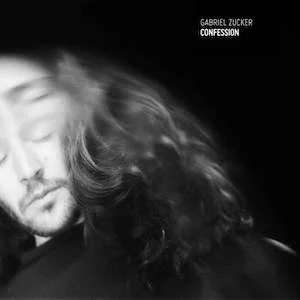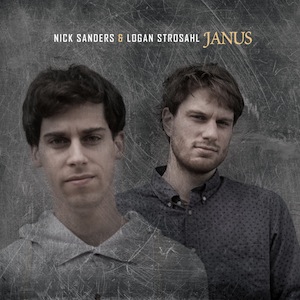Label: Boomslang Records, 2025
Personnel - Gabriel Zucker: pianos, synths, electronics, keyboards, voice, compositions, lyrics; Eva Lawitts: bass; Grey Mcmurray: guitar; Connor Parks: drums; Henry Mermer: drums // Bergamot Quartet (Ledah Finck, Sarah Thomas, Amy Huimei Tan, Irene Han): strings // Guests - Robby Bowen: drums (#2); Taja Cheek: voice (#3); Laura Cocks: flute (#8); Alfredo Colón: alto saxophone (#2,11); Matt Nelson: tenor saxophone (#2,11); Ledah Finck: violin (#3); Alex Goldberg: drums (#10); Daniel Kleederman: guitar (#12); Matteo Liberatore: guitar (#3); Adam O’Farrill: trumpet (#9); Alena Spanger: voice (#12).
Gabriel Zucker is a versatile singer-songwriter, multi-instrumentalist, and composer whose artistic vision thrives on intricate, almost mathematical balancing acts. On his sixth studio album as a leader, Confession, the musical polymath fronts a core quintet featuring two drummers, and incorporates a string quartet into a set of demanding compositions, achieving a compelling equilibrium between pathos and intensity. His multifaceted response to disconnected times is marked by radical transitions and conspicuous shifts in mood.
Initially wrapped in swirling synths and wiry electronic textures, “Velvet Ball of Light” pushes decisively into indie-rock territory through forceful lyrics, emphatic drum kicks and cymbal crashes, and Zucker’s unorthodox pianism—dense with exclamatory staccatos yet never abandoning melodic clarity. “Confession #1” brings saxophonists Alfredo Colón and Matt Nelson to the fore, firing punchy lines over a muscular, dark rock backdrop that carries undeniable dance appeal, with guest drummer Robby Bowen helping to keep the undercurrent bubbling.
The saxophonists reappear more discreetly on “The Road”, an odd-metered ballad that stands in stark contrast to “Redeye to London”, a genre-crossing track propelled by trance-like breakbeats and electronic processing, further energized by Grey McMurray’s electric guitar.
“Intentional (But Never How You Wanted)” features fluid, frictionless piano streams running atop unexpected drum syncopations. Its vocal and instrumental language opens multiple reference points, moving effortlessly from the art-rock sensibility of David Bowie to the progressive impulses of King Crimson and the modern fusion vocabulary of Tigran Hamasyan. Driven by heavy bass pulses, the piece swells into a dense, chaotic mass before breaking abruptly into the calmer, constantly shifting “Trampling the World”.
“Confession #2” vibrates with polyrhythmic momentum and experimental flair, threaded through with cinematic string writing and Laura Cocks’ expressive flute. The poignant “Away, Carelessly” pairs Zucker with the iconoclastic trumpeter Adam O’Farrill, whose roaming, unanchored discourse heightens the sense of emotional unease. The album closes with “Listen to Me (I Know You Won’t)”, which introduces Brooklyn-based singer Alena Spanger alongside psychedelic-leaning guitarist Daniel Kleederman, both contributing to a refined and emotionally charged finale.
By turns introspective and euphoric, Confession allows Zucker’s eccentric impulses to guide an ambitious production that ultimately plays to its strengths.
Favorite Tracks:
01 - Velvet Ball of Light ► 02 - Confession #1 ► 05 - Intentional












